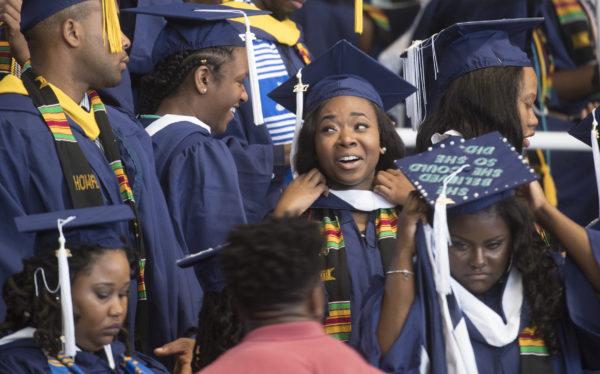A new study shows individuals who graduate from Historically Black Colleges and Universities create an economic impact of $14.8 billion in the American economy.
The report contends if alumni of these schools were viewed as a business, they would be ranked in the 200 of Forbes Fortune 500 list.

According to the “HBCUs Make America Strong: The Positive Economic Impact of Historically Black Colleges and Universities” study, commissioned by the Frederick D. Patterson Research Institute, a research arm of the United Negro College Fund, Black institutions, founded to educate formerly enslaved African Americans, create economic growth leaders who “enter the workforce as better thinkers and learners, with greater expertise and vastly enhanced earning prospects.”
Popular examples of HBCU attendees who have many known have made an impact on the American economy through their industries are business people include:
- Media mogul Oprah Winfrey (Tennessee State University, entertainment)
- Lifestyle influencer Sean Combs (Howard University)
- Janice Bryant Howroyd, the first African-American woman in the United States to own and operate a billion-dollar business, (North Carolina A&T University),
- John W. Thompson, a software and tech executive (Florida A&M),
- Rosalind Brewer, the first Black woman to Lead a Walmart Division, (Spelman College)
- Inventor Lonnie Johnson (Tuskegee University.)
However, the research provided data that considered the direct spending by the colleges and universities on the faculty teaching at the institutions, weighed the salaries of their employees, combed through their investment in academic programs and operations and examined the students’ spending patterns.
Just as institutional investment was a dynamic in the study, so were the spending habits of students while they matriculated through their bachelor’s programs.
Public HBCUs, which include schools like Howard University, Florida A&M University, Morgan State University and Grambling University, account for $9.6 billion of that total economic impact measured by the UNCF.
Private HBCUs like Spelman College, Morehouse College and Xavier University, have made less impact than the state-run schools, despite usually having higher tuition. The study says these schools account for $5.2 billion in total economic impact.
“Every dollar in spending by an HBCU and its students produces positive economic benefits, generating $1.44 in initial and subsequent spending for its local and regional economies,” the report stated.
“Many HBCUs are in regions of the country where overall economic activity has been lagging, making the colleges’ economic contributions to those communities all the more essential.”
Because of the credentialing, the study revealed, graduates from these Black colleges and universities who work full-time jobs tend to earn in a lifetime an additional $927,000.
A different study released in February 2022, conducted by Online U, a data-driven resource site for students looking for affordable options in higher education, showed there are personal financial payoffs some HBCUs offer, which by extension supports a healthy economy.
The site examined the median earnings of alumni based on their respective colleges and juxtaposed them against the salary threshold of the state in which they live in. The site identified the following schools with the “highest payoff” considering their state’s median as Xavier University of Louisiana (1), Spelman College in Georgia (2), Hampton University (3), Morehouse College (4) and Florida A&M University (5).
Another benefit Blacks who attended HBCUs enjoy is better health, a phenomenon that is indirectly connected to economic impact. According to a report done by Harvard University, healthier people are more economically productive.
Researchers from Ohio State University discovered in the National Longitudinal Survey of Adolescent to Adult Health that Black Americans who attended an HBCU were 35 percent less likely to develop metabolic syndrome by midlife than people of African descent who graduated from a predominately white institutions.
Three of the five major risk factors for Black people, heart disease, stroke, and diabetes, can characterized as metabolic syndrome.
Businesswoman Kori Hale, the CEO of CultureBanx and a contributor to Forbes, celebrated the news in the reports but drew attention to the massive debt 80 percent of HBCU graduates carry in loans when leaving the schools.
She noted that because HBCUs have a “greater share of low-income students” who tend to graduate with student loan debt, alleviating the strain of a student loan for an enthusiastic college graduate can help elevate the Black community through capital collective strength and generational wealth.”
Despite there being more work to do, she believes the research shows “HBCUs continue to serve as economic engines and generators of Black wealth.”


